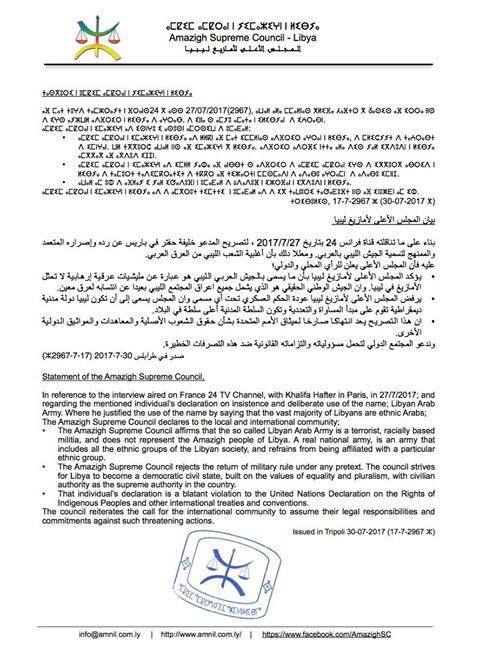By Farida Waleed.
Tripoli, 31 July 2017:
“Tripoli is safe,,, and you can visit it. I invite you to evaluate it by yourself.”
This is what Faiez Serraj, the head of the Presidency Council (PC) and prime minster of the government of national accord, said to the presenter in an interview with France 24. It was just after last week’s Paris meeting with Khalifa Hafter organised by French President Emmanuel Macron to try and bring an end to the chaos in Libya.
But is Tripoli really as safe as Serraj says?
The city is witness to numerous types of crimes every day – murder, robbery, kidnapping, harassment, shooting in the air for no reasons. The streets become a safe haven for militias after sunset, but for few others – but they are safe for Serraj, the man who has been trying and failing to gain control of the city since his arrival with the rest of the PC in March 2016.
After sunset, Tripoli becomes insecure and far too uncomfortable to drive around or go out – but it’s safe for the PM.
The night is a time of trepidation for most ordinary residents, a time to stay at home. There is, in effect as self-imposed curfew for most people. Some people think that is an exaggeration, especially those who still take the revolutionary line.
If you complain and say Tripoli is not safe, you will be considered a supporter of Qaddafi regime or Libyan National Army in east of Libya and\or an opponent of 17 February Revolution.
What you hear if you complain is “you’re Tahloob (“an algae”). “Tahloob is the term of abuse to describe Qaddafi loyalists, a reference to the green of Qaddafi’s flag and his political movement.
In the morning, life partially returns to normal. Students can be seen going to schools, women drive, traffic policemen a on duty but, of course, cannot do anything those who drive vehicles with tinted windows and without number plates.
The city is now mainly controlled by Katibat Thuwar Trablus (Tripoli Revolutionaries Brigade) commanded by Haitham Tajouri. He is allied with Abdulghani Kikli – known as Ghneiwa. In May, they ousted the militias backing the pro-Islamist, self-styled National Salvation Government, headed by Khalifa Ghwell.
“I saw militiamen in the middle of Tripoli trying to steal an expensive car infront of a load of people in a busy street,” one Tripoli resident said last week.
“No one could do anything because the militia members were armed. The driver had to flee to his save life.”
Tripoli had become “a city of gangs and not the capital,” he said, asking that his name be kept secret. “It’s completely terrible.”
Another citizen, speaking on his phone in a supermarket, tells the person at the other end: “No no. I can’t drivealong the motorway at night. You know it’s full of gangs.”
It is not just inside Tripoli, it is also the coastal road west of the city that has been closed for more than two years. Sometimes it is reopened a few days some days, before being closed again due to gang activity. But it is safe for the PM.
The coastal road has become the subject of jokes doing the rounds at the moment: If people want to get rid off someone they ask him to drive along the coastroad. Some others call it the “road to the end”, meaning you go there and never return.
In January this year, PC member Ahmad Maetig made the same claim about Tripoli being safe at London’s Conference for Investment and Reconstruction of Libya, but two days later fierce clashes erupted in Tripoli.
Just ho unsafe it is has been disclosed by the interior ministry’s Criminal Investigation Department (CID). It released some days ago the crime statistics for Tripoli in June on its Facebook page:
- 216 cases of armed robbery, resulting in the death of 8 people.
- 83 reports of people kidnapped including 14 foreigners.
- 73 cases of armed robbery on shops pharmacy, and gas cylinder distributors.
- 128 bodies found in streets including 34 of foreign nationals and 94 for Libyan whose families did not pay ransoms.
- 26 criminals have been arrested.
The PC’s ministry of interior still does not want to recognise the authentication of this CID.
But, again, Tripoli is still safe for the PM.
To be safe in your city it does not require simply getting rid of the militias. It also means providing all the necessary services such as electricity, water and cleaning. The capital has been suffering too from frequent power cuts which usually lead to water shortages, because the water pumps of the Man-Made River stop working.
The streets is sinking under stinking sacks of garbage left for days. People line up for more than ten hours in front of banks to get some cash; some have not been paid their salaries for more than six months. Prices go up insanely everyday.
But it is still safe for the PM.
Farida Waleed occasionally reports from Tripoli for the Libya Herald.
OpEd and Opinion articles do not necessarily represent the views of the Libya Herald.







